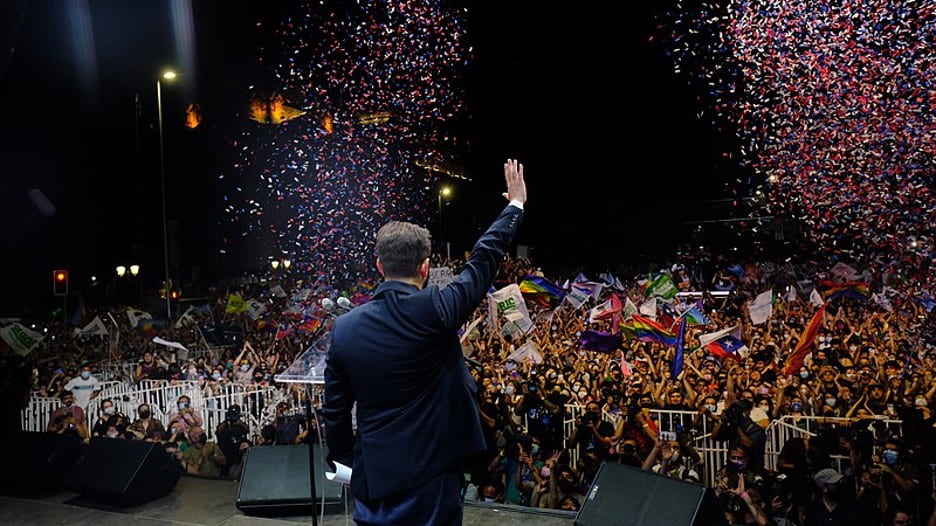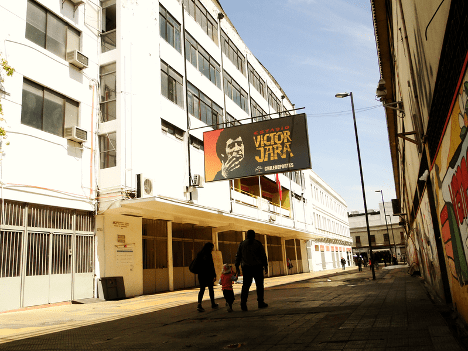
About the Author
Sofia Andrade is a journalist and undergraduate at Harvard University, where she studies History and Literature and Women, Gender, and Sexuality. A Miami native with roots in Ecuador, she writes about issues of gender, migration and Latinidad in politics, arts, and culture. Her work has appeared in Slate, The New York Times, The Harvard Crimson and the Harvard Political Review.
The Chilean Election and the Politics of Memory

Gabriel Boric giving his victory speech at 2021 Chile presidential election. Credit: Fotografoencampana (https://commons.wikimedia.org/wiki/File:Gabriel_Boric_giving_victory_speech.jpg)
Growing up in Miami, I have always been interested in the relationship between Latin America and the United States when it comes to politics. I’m the oldest of my siblings and the first in my immediate family to be born in the United States after my parents immigrated from Ecuador. Now at Harvard, I’ve been able to explore these complex relationships in many classes, the most recent being Jennifer Alpert’s “Dictatorship and Resistance in Latin America,” focusing on the dictatorships in Argentina and Chile. We studied the ways in which both countries continue to reckon with the memories and traumas of that era. Last month, everything I learned in that class was laid bare in Chile’s presidential elections.
I closely followed the December 19 runoff elections in which leftist Gabriel Boric won with 55.87 percent of the vote. It was a critical moment in the nation’s history as Chile’s voting population decided whether to break with its dark, not-too-distant past. Boric, a young lawmaker in the new left Social Convergence party and Apruebo Dignidad coalition, ran against José Antonio Kast, a far-right member of Chile’s Republican Party and Christian Social Front alliance.
Kast had won the majority of the preliminary vote in November (28 percent versus Boric’s 26) amidst a year-long national debate over General Augusto Pinochet’s deeply unequal market-centered economic model: a clear ideological descendant of the Chilean dictator, who ruled from 1973 to 1990. Boric, in an undeniable resurrection of history, is a vocal admirer of President Salvador Allende, the democratically elected socialist overthrown by Pinochet, with the help of the United States and the Chilean military.
As someone concerned with social justice, I was hyperaware of the fact that Kast would have been Chile’s most right-wing head of state since Pinochet. His views on divorce, abortion, LGBTQ+ rights, Indigenous rights, the climate crisis, immigration and countless other topics are best described as ultra-conservative and out of touch with Chileans who have taken to the streets over the past two years to demand social and economic justice and an end to police impunity (a clear vestige of the dictatorship). Some of Kast’s specific goals: to leave the U.N. Human Rights Council, build more prisons, and to pardon the Pinochet-era officials responsible for countless human rights abuses. Until weeks before the election, he also wanted to get rid of the country’s Ministry of Women and Gender Equity. It was only on December 2 that he admitted it was an “error.”
“If Pinochet were alive, he would have voted for me,” Kast said during his failed campaign for president back in 2017. It was also back then that he proposed immediately pardoning the (few) incarcerated members of Pinochet’s military regime.

José Antonio Kast speaks at a campaign press conference on August 30, 2021. Credit: Mediabanco Agencia (https://commons.wikimedia.org/wiki/File:Punto_de_prensa_José_Antonio_Kast_30_08_2021.jpg)
In 2018, Kast claimed that on Sept. 11, 1973, when the military overthrew Chile’s democratically elected President Allende and bombed the capital before instating Pinochet, “Chile chose freedom.” Never mind the fact that Pinochet’s cruel, 17-year-long occupation of Chile was infamous for the state-executed disappearances of more than 3,000 civilians—the desaparecidos—and the clandestine torture and detention of tens of thousands more.
Even still, Kast, the son of a Nazi army lieutenant and brother of Pinochet’s minister of labor, had made a name by praising the dictator. In a speech given after the preliminary elections, Kast claimed that Chileans faced a hypothetical choice in the 2021 election: “freedom” or “communism.” The lawyer was not only leaning into the right’s reactionary rhetoric, but also taking inspiration from the so-called principles that Pinochet’s junta used to take over the state.
By using rhetoric closely aligned with la junta’s own, Kast relied on similar obfuscation and fear-mongering language to assert his legitimacy as a “steward for freedom” in the face of an allegedly dangerous and “anti-freedom” enemy. In this case, Kast paints the threat to Chile’s “liberties” as coming from the “communist” Boric. In doing so, he resurrects the dictatorship’s shady claims to power all the while positioning their justification relative to his own desired ascent.
For me, as someone who came of age amid a similarly reactionary and anti-immigrant presidency here in the States, Kast’s (white) nostalgia-fueled trip to the run-off seemed familiar. One needn’t look too far to see how, as a Pinochet-wannabe, Kast was also positioning himself in the shadow of Donald Trump and the far-right reactionary movement occupying the United States and beyond. Like Trump, the ultra-conservative Kast rallies his base against the “radical left” by selling to a “silent majority” a fantasy version of Chile that, with just enough political handwringing, can exist “again.” Similarly motivated by classism and racism, Kast’s answer to Trump’s wall, for example, is a 10-foot-deep ditch along the country’s northern border to “control” immigrants from Haiti and Venezuela. As the child of immigrants who themselves moved to escape political instability in their home country, I know well the dangerous consequences of such rhetoric.

A group of activists prop up a puppet of Kast during the campaign period for the December runoffs. Credit: Mediabanco Agencia (https://commons.wikimedia.org/wiki/File:Mono_de_Antonio_Kast.jpg)
That ideological relationship between Kast and Trump raises key questions: What does it mean for a presidential candidate touting freedom, individualism and “economic miracles” to be a part of this global wave of right-wing movements? What does it mean for this election predicated on the idea of a “Chilean national identity” to be so inextricably linked to the U.S. context through Kast and his support of the dictator the United States helped put into power?
Crucially, though, this election was also about memory. And it was about ghosts. The ghost of the dictatorship as well as of its traumas. The afterlives of Pinochet’s and Allende’s legacies speak very directly to the race in which both candidates had purposefully assumed (Kast) or otherwise been assigned to represent [Boric] the ghost of their predecessors.
The November 21 primary election was the first time the desaparecidos were recognized in the electoral process by being included in the voter rolls. Culture, too, has shown how the traumas of the dictatorship and its abuses remain ever present in the national imaginary. Chilean writer Nona Fernández’s 2016 book The Twilight Zone follows Andrés Valenzuela, a real-life torturer under the Pinochet government whose story had been published in an opposition magazine in 1984. Fernández takes this context and runs with it, crafting a compelling exercise in imagination that seeks to unearth the brutal realities of the dictatorship and its effect on national memory through a cutting exploration of one of its own.
The first public, state-sanctioned reckoning of Pinochet’s dictatorship took place on Oct. 5, 1988, when international pressure forced Pinochet’s de facto government to hold a national plebiscite to determine whether the dictator would remain in power for eight more years. After weeks of nonstop political campaigning, the population remained split in half. A majority of 56 percent of Chileans voted “No” to the dictatorship. The other 44 percent who voted “Yes” did so for a variety of reasons: among them the economy, the desire for “order,” and the fear of socialism. The plebiscite thus represented a conflict that would continue to haunt Chile through the present: the push and pull between justice and reckoning, and stagnation under the shadow of the dictatorship.
With the newly democratic Chilean government came a series of reports aiming to jumpstart the process of facing the dictatorship’s crimes in earnest. But perhaps the most obvious move towards justice and a rebuke of the dictatorship came in the form of Chile’s museum of memory. The Museo de la Memoria y los Derechos Humanos was inaugurated by President Michele Bachelet in 2010, 20 years after the end of Pinochet’s rule. The fact that it was created after so long proves that the dictatorship is undoubtedly something that the Chilean people continue to reckon with, that justice has not yet been reached. The election, in turn, serves as a reminder that though the path to justice continues — even if only towards the symbolic justice represented by the museum — it is hardly a straightforward one.
Chile, like many other countries in Latin America, has a complex and long-standing history with memory (and forgetting). Memory can be posited as an avenue towards justice, predicated on meaningful engagement with and interrogation of the past. But it can also be a crutch that prevents the country from moving forward. The memories of the Pinochet era continue to haunt the Chilean socio-political sphere though an inescapable specter of the dictatorship. And in looking at Kast’s rise to the run-offs, a rise propelled off the backs of the dictatorship’s many ghosts, the need to push back against that type of limiting memory feels evident.
In the Chilean national consciousness, there is the idea of the past as something that must be addressed. In Chilean art as in social movements, this type of justice is practiced through acts of resistance aimed at questioning the past and its future retellings. In my class, we spent a lot of time studying these reclamations of history as vehicles for justice beyond the state. We learned how art and fiction, for example, have served as ways to mediate and elaborate history. When official narratives of the dictatorship, of its abuses, and of the required justice fall short, it is art and fiction that rise to the challenge of telling the deeper truths, of engag4ing with the past honestly. These forms of resistance help us understand how countries like Chile rewrite their past in the present, and thus force us to contend with how the ghosts remain.

A sign for Estadio Victor Jara. Credit: Jo Novells (https://commons.wikimedia.org/wiki/File:Estadio_V%C3%ADctor_Jara_(calle).PNG)
The stadium where many of Chile’s future leaders give their campaign speeches was renamed Víctor Jara Stadium in 2004 in memory of the famous Chilean folk singer, poet, teacher and socialist activist who was brutally tortured at the site (formerly named Estadio Chile). It wasn’t until 2018 that nine of the ex-military responsible for Jara’s 1973 death were sentenced after a long legal battle. The longest sentence given was 15 years. In 2016, a former army officer was found liable for Jara’s torture and assassination in Florida. He has yet to be extradited, despite an order from Chilean authorities and demands from activists and Jara’s family members that it be enforced.
Pinochet’s 1980 Constitution (which will soon be replaced under Boric) arguably set the stage for this kind of impunity by establishing avenues for “senatorial impunity,” protecting military officers and consolidating power in the presidency. It is part of the reason why, by 2015, there had been 1,149 convictions handed down to some of the military officers and police responsible for human rights abuses during the dictatorship, but the vast majority of abusers still had yet to be convicted or face justice due to a combination of impunity laws and lack of government action.
Kast’s ascent can be seen as a symptom of unresolved trauma. His shot at the presidency is proof that the national reckoning over Pinochet’s rule hasn’t yet fully happened. The same can be said of the fact that this election, specifically, is so steeped in the ghosts and memory of the Pinochet era. The resurrection of the alleged right versus left battle for national identity that la junta used to take power in the first place, as evidenced in Kast’s reactionary rhetoric, is only further proof.
In a New York Times review of the recent English translation of Fernández’s The Twilight Zone, Chilean intellectual Ariel Dorfman writes, “[Fernández] understands that, rather than fleeing from Valenzuela, we must pursue him and his secrets if there is ever to be a reckoning with the demonic legacy of men like him.”
“It is up to us to risk entering that history and its blaze,” Dorfman, a dictatorship-era exile, continues, “to accompany [Fernández] into that terrifying landscape and try to communicate with its ghosts.”
Perhaps, the same can be said of the dictatorship as a whole. A reckoning with its legacy necessitates sincere and critical interrogation of its abuses and injustices, as well as the reality of its ideological descendants like Kast. This semester and the election alike have taught me that memory and justice are inextricably linked. In cases of state-sanctioned trauma like that of the Pinochet dictatorship, meaningful engagement with the past through memory is often a critical vehicle for securing justice when the state refuses to do so. When that engagement doesn’t happen is when ghosts can be resurrected, and candidates like Kast can threaten to resurrect the past as well.
More Student Views
Puerto Rico’s Act 60: More Than Economics, a Human Rights Issue
For my senior research analysis project, I chose to examine Puerto Rico’s Act 60 policy. To gain a personal perspective on its impact, I interviewed Nyia Chusan, a Puerto Rican graduate student at Virginia Commonwealth University, who shared her experiences of how gentrification has changed her island:
Beyond Presence: Building Kichwa Community at Harvard
I recently had the pleasure of reuniting with Américo Mendoza-Mori, current assistant professor at St Olaf’s College, at my current institution and alma mater, the University of Wisconsin-Madison. Professor Mendoza-Mori, who was invited to Madison by the university’s Latin American, Caribbean, and Iberian Studies Program, shared how Indigenous languages and knowledges can reshape the ways universities teach, research and engage with communities, both local and abroad.
Of Salamanders and Spirits
I probably could’ve chosen a better day to visit the CIIDIR-IPN for the first time. It was the last week of September and the city had come to a full stop. Citizens barricaded the streets with tarps and plastic chairs, and protest banners covered the walls of the Edificio de Gobierno del Estado de Oaxaca, all demanding fair wages for the state’s educators. It was my first (but certainly not my last) encounter with the fierce political activism that Oaxaca is known for.




